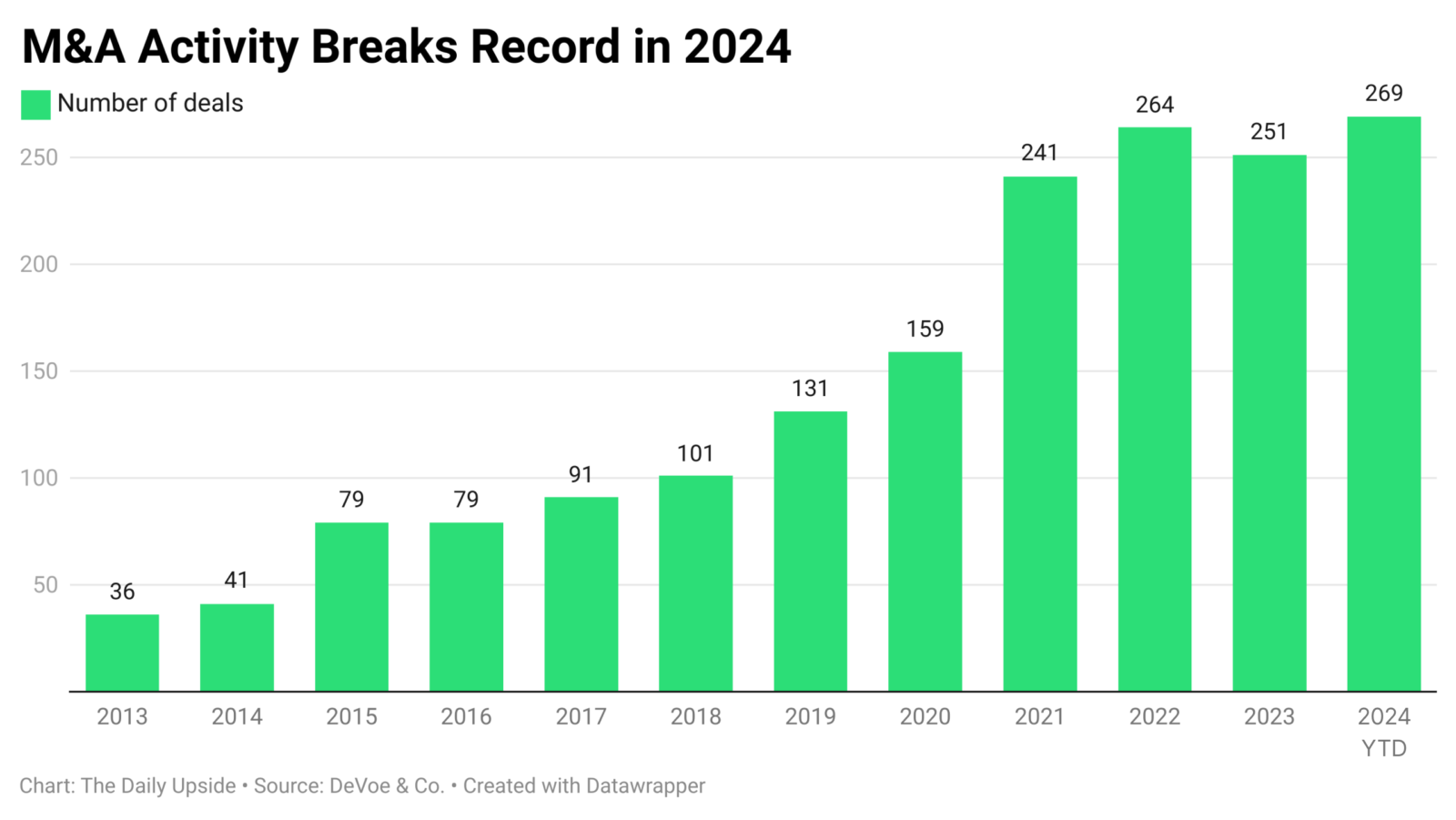Good morning.
The holidays are upon us, and that means it’s time for those 2025 predictions that usually age as well as that carton of eggnog in the back of the fridge.
Has the Fed conquered inflation? Will tariffs weigh on economic growth? Are we living in a gigantic AI bubble? Your guess is as good as ours, but there are a handful of industry trends that will continue to gain steam along the way. What we do know is 2024 was an impressive year for the markets and that generally leads to satisfied customers. Happy clients, happy life.
Let’s dive right in.
(Editor’s note: Due to the holidays and the aforementioned eggnog, we’re taking a break until after the new year. See you Jan. 2.)
PE Invasion Weighs on Wealth Management

Private equity firms just couldn’t keep their hands off wealth managers in 2024.
With markets roaring and assets hitting all-time highs, there were at least a half a dozen multi-billion-dollar deals that shook the industry this year. Fisher Investments cemented a $3 billion deal in June, followed by Envestnet’s $4.5 billion sale in July, and there were dozens of others. In fact, M&A activity set new records in the registered investment advisor space, with 269 total transactions completed so far in 2024, according to DeVoe & Co. As these massive advisory firms get larger, so do their value propositions. PE investors are expected to become more aggressive in 2025 as interest rates decline, leading to even bigger and more frequent deals, according to the study.
There are certainly questions about how the new powers that be will behave. Some experts question whether PE firms will run into conflicts of interest trying to uphold fiduciary standards, while squeezing out profits for investors. It’s an open ended question that may take years — or, shall we say, fund life cycles — to figure out.
Tip The Scales
PE has been smitten with wealth management for the better part of a decade, and for good reason. By the end of 2029, the value of wealth management firms globally will approach $3 trillion, up from just under $2 trillion last year, according to a report. A Cerulli estimate pegged the opportunity for RIA acquisitions at $3.7 trillion last year. Other major deals this year include:
- TPG’s minority stake in the largest RIA Creative Planning, valuing it at a reported $15 billion.
- CI Financial’s all-cash deal with Mubadala Capital that took it private at a valuation of $8.6 billion.
- PE firm KKR’s purchase of the $150 billion wealth manager Janney Montgomery Scott in July.
- There’s more, but you get the picture.

Not So Fast. What does an influx of PE money mean for the industry as a whole — and for the end clients advisers are trying to serve? Well, all that private equity attention may be starting to take its toll. While private equity brings in more funding, it’s also expecting lucrative profits on tight time tables.
A report from Forrester cited the massive tech provider InvestCloud, which has been majority-owned by Motive Partners and Clearlake Capital since 2021. Earlier this year, the firm raised its service fees 5% despite complaints about slow platform enhancements. If private equity continues to prioritize revenue over platform improvements and customer support, wealth managers may seek alternatives, according to the researchers.
How to Start an RIA: A Guide to Going Independent
The business of financial advice is booming, and the M&A market for fast-growing firms is buoyant. It’s no wonder that many entrepreneurial advisors have considered making a jump, hanging their own shingles, and creating their own firms.
Before you do, consider these key questions:
- Does your current contract, non-compete, or other agreements impact your ability to launch a firm?
- How much time and money does it take to register and launch a new RIA?
- What are the biggest hurdles to building your own pipeline?
To help you navigate the transition, Betterment Advisor Solutions has developed a three-phase roadmap that covers everything you need to know from registering your firm with regulators to setting up compliance frameworks to building a deep bench of quality clients.
Take the first step toward independence and download the “How to Start an RIA” guide.
Can Private Assets Reshape Index Investing?
Asset managers are literally attempting the impossible in 2025.
The likes of State Street, Apollo and Invesco are all racing to package private assets into indexed products in a move that would open up the strategies to retail investors. BlackRock’s Larry Fink said he wants to “index the private markets” and made it rain this year, announcing three major multi-billion-dollar deals. There are now filings with the Securities and Exchange Commission that are requesting permission to launch new ETFs that hold both public and private assets.
The catch? They’re not allowed under current SEC rules.
Closed for Private Party
Private placements, of course, don’t trade on traditional markets and can include lucrative, and sometimes speculative, strategies like investments in home lending, real estate, private equity, or infrastructure. The filings could become the first major step toward opening up alternative assets to the masses, and would likely revolutionize index investing if approved.
The rub is that the SEC imposes a 15% limit on funds holding illiquid assets. Such investments are generally defined by the agency as anything that requires a week or more to sell without adjusting the price. One of the reasons — and a major cause for concern — is that ETFs trade daily, but private assets are generally marked quarterly or even annually. That can make it tricky to put a price on the underlying assets.
Issuers may get around the rule by using so-called synthetic exposure, according to Bloomberg, which would allow the funds to hold swaps written against a private equity portfolio. The products could also use liquid alternatives that take advantage of complicated strategies, like short selling, to match the performance of the underlying private investments.
Private Parking. If issuers can find a fix, advisors should be eager to jump on board. Cerulli Associates predicts that advisors will eventually use ETFs to access alternative investment products more in the coming years.
- Cerulli’s findings show that 30% of advisors currently report unmet demand for alternative ETF products.
- Researchers concluded that advisors will eventually use ETFs to access a wider range of alternatives, including private credit funds that have yet to be approved by the SEC.
Wall Street’s Hush-Hush Cash Sweeps Take Center Stage

One of Wall Street’s most lucrative, and secretive, revenue streams may be drying up.
The largest broker-dealers have quietly moved clients’ uninvested cash into low-yielding accounts that earned them up to 10 times what they paid out to customers. Called cash sweeps, the programs have been around for decades and one study even found it cost investors upwards of $500 million over a six-year period. Not so much in 2024. Higher yields in everyday saving accounts and a rash of high-profile lawsuits and investigations over the practice are now taking the industry by storm.
It’s forcing clients to rethink their cash strategies and move their assets out of brokerage accounts.
Sweep It Under the Rug
In response, Wells Fargo said in a second-quarter earnings call that it would pay customers more on their cash, and that the firm could take a potential $350 million hit in its wealth arm this year. Not to be outdone, Morgan Stanley quickly announced it would pay its clients 2% in July. The company also announced a revenue loss in its sweep accounts, which topped $1.798 billion for the second quarter, down 17% from a year ago. Some dozen firms are now facing legal challenges:
- Customers alleged Morgan Stanley broke its fiduciary duty to clients by paying just 0.01% on uninvested cash, far below market rates.
- JPM faced a similar class-action lawsuit over the bank channeling customers’ idle cash into low interest rate accounts.
- Raymond James also got caught up in the lawsuit maelstrom this time alleging it only paid customers 0.25% to 3%, significantly lower than average.
The sweep programs, known in earnings reports as Net Interest Income, weren’t all cash grabs though. The additional revenue often subsidized other parts of the business. For example, it allowed low-cost pioneers, like Charles Schwab (who was the first to pay an SEC penalty over the matter in 2022), to offer their robo advisors for free, but forced them to keep a percentage of their assets in cash.
Dollar Here, Dollar There. The firms are looking for ways to supplement the lost revenue. Charles Schwab executives said the firm will look toward expanding its advice offering to retail clients in the new year, especially those that are being ported over in the TD Ameritrade deal. Those financial advice relationships are a lucrative and predictable fee-based revenue stream.
Addressing losses to its NII accounts, Morgan Stanley’s CFO Sharon Yeshaya said it was due to changes in the competitive dynamics. They’re expected to be offset by “repricing” the overall investment portfolio, she said.
Extra Upside
- Want a Raise? Financial advisor pay jumped 17% from 2019 through 2023, according to a Schwab study.
- Bad Advisor, Bad: The 10 worst financial advisor cases of 2024.
- Making the Jump to Independence? Betterment’s “How to Start an RIA” guide walks you through essential considerations like obtaining legal guidance and certifications, registering with the SEC, and setting up your tech stack. Read the guide today.
ICYMI
- Rotation Time? Wharton School professor Jeremy Siegel sees Big Tech fizzling out in 2025.
- ‘Merica. ETFs are breaking inflow records in the US. Not so much overseas.
- Welcome Aboard. Fidelity hired new head of 1,700-member family office network.
Advisor Upside is edited by Sean Allocca. You can find him on LinkedIn.
Advisor Upside is a publication of The Daily Upside. For any questions or comments, feel free to contact us at advisor@thedailyupside.com.

